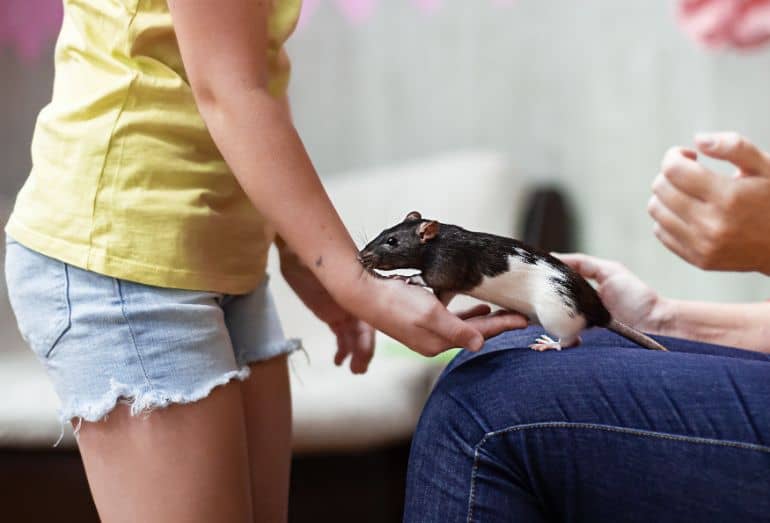Rats are some of the most intelligent and fascinating creatures that roam the earth. As a pet rat owner, I have been asked countless times whether rats are ticklish.
The question may seem trivial, but it has sparked a lot of debate among rat enthusiasts, researchers, and animal lovers. In this blog post, we will explore the science of tickling, whether rats experience ticklish sensations, why they may or may not be ticklish, the effects of tickling on rats, and how to ethically tickle rats.

What is Tickling?
Before we delve into whether rats can be tickled, we need to understand what tickling is. Tickling is the sensation produced by light, repetitive touch or pressure on sensitive parts of the body, such as the skin or hair.
Tickling can produce different responses depending on the person or animal being tickled. Some people may laugh uncontrollably, while others may squirm or try to escape.
The Science of Tickling
The science of tickling is still not fully understood, but researchers have come up with some theories. One theory suggests that tickling may have evolved as a form of social bonding between humans or animals.
Another theory suggests that tickling evolved as a way to improve defensive reflexes in animals by teaching them to protect their sensitive areas. Regardless of the reason for tickling, the sensation is produced by the activation of nerve cells that respond to light touch or pressure.
Do Rats Experience Tickling Sensation?
Now that we understand what tickling is, let’s explore whether rats can experience ticklish sensations.
Ticklishness in Rats
While there is no definitive answer to whether rats are ticklish, some researchers have suggested that they may be.
Rats have sensitive skin and whiskers that respond to touch, so it is possible that they may experience ticklish sensations. However, not all rats may be ticklish, just as not all humans are ticklish.
Experiments on Rats’ Ticklishness
To test whether rats are ticklish, researchers have conducted experiments where they stroked rats’ feet or bellies and observed their responses.
Some rats showed signs of ticklishness by wriggling, squirming, or making high-pitched vocalizations. However, not all rats responded in this way, which suggests that ticklishness may be subjective and vary between individuals.
Rats can laugh
In one experiment published in Scientific American it was discovered that rats that are ticklish will actually laugh when tickled. Unfortunately, the frequencies at which they laugh are inaudible to the human ear.
Why Rats May or May Not Be Ticklish?
So why do some rats appear to be ticklish while others do not? There are several theories and explanations.
Theories and Explanations
One theory is that ticklishness may be related to a rat’s personality. Rats that are more social and playful may be more likely to be ticklish than those that are more anxious or timid.
Another theory is that ticklishness may be related to the rat’s sensitivity to touch. Rats with more sensitive skin may experience ticklish sensations more easily than those with less sensitive skin.
Differentiating Ticklishness from Other Reactions in Rats
It is important to note that not all reactions to touch in rats may be related to ticklishness. Some rats may react to touch with aggression, fear, or discomfort, which are not signs of ticklishness.
Therefore, it is important to differentiate between ticklishness and other reactions to touch when observing rats’ behaviors.
Effects of Tickling on Rats
Assuming that rats can be ticklish, what are the effects of tickling on them?
Behavioral and Physiological Responses to Tickling
Some researchers have suggested that tickling may have positive effects on rats’ behavior and physiology. For example, tickling may increase rats’ playfulness, social interaction, and exploration.
Tickling may also stimulate the release of endorphins, which are natural painkillers that can improve rats’ mood and reduce stress.
Purposes of Tickling for Rats
Given the potential benefits of tickling, some rat owners may use tickling as a way to bond with their pets or improve their well-being.
However, it is important to ensure that tickling is done ethically and in a way that respects rats’ needs and preferences.
Tickling Rats Ethically
When tickling rats, it is important to consider their welfare and respect their rights as sentient beings.
Considerations for Tickling Rats
Some considerations when tickling rats include:
- Consenting rats: Rats should have the choice to participate in tickling sessions and should not be forced or coerced to do so.
- Respectful touch: Tickling should be done gently and in a way that respects rats’ boundaries and preferences. Some rats may not enjoy being tickled or may prefer a different type of touch.
- Safe environment: Tickling should be done in a safe and comfortable environment that minimizes the risk of injury or stress to rats.
- Positive reinforcement: Tickling should be paired with positive reinforcement, such as treats or praise, to encourage rats to participate and associate tickling with positive experiences.
Conclusion
In conclusion, whether rats are ticklish is still a subject of debate among researchers and rat owners. While some rats may appear to be ticklish based on their behaviors and responses to touch, not all rats may experience ticklish sensations.
If you choose to tickle your pet rats, it is important to do so ethically and in a way that respects their welfare and rights. As with any interaction with animals, the key is to be respectful, considerate, and attentive to their needs and preferences.
- How Long Do American Eskimo Dogs Live? Important Factors and Care Tips - September 29, 2023
- Do American Bulldogs Need Grooming? Essential Tips and Care Guidelines - September 29, 2023
- Do Bengal Cats Enjoy Playing? Essential Tips for Keeping Them Active - September 29, 2023